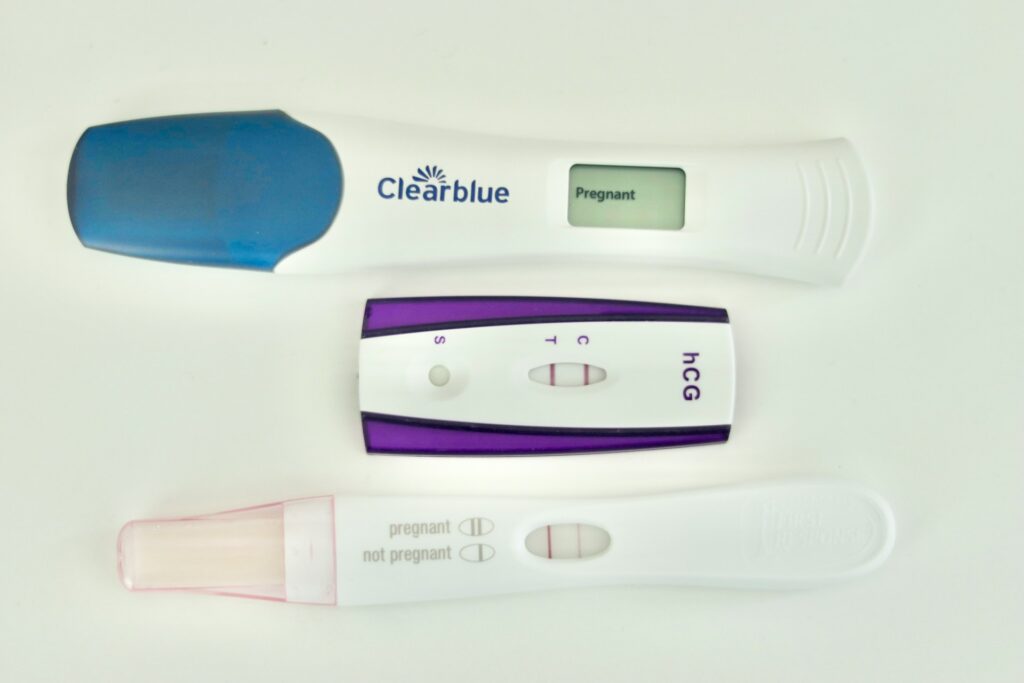Taking a pregnancy test is often a significant moment in a woman’s life, whether you’re hoping for a positive result or bracing for a negative one. Pregnancy tests are designed to detect the presence of the hormone human chorionic gonadotropin (hCG), which is produced after a fertilized egg attaches to the uterus. In this comprehensive guide, we’ll cover everything you need to know about pregnancy tests, including how they work, when to take them, and how to interpret the results.

How Do Pregnancy Tests Work?
Pregnancy tests work by detecting the hormone hCG in your urine or blood. This hormone is produced by the placenta shortly after the embryo attaches to the uterine lining, and its levels increase rapidly in the early stages of pregnancy.
Types of Pregnancy Tests
There are two main types of pregnancy tests: urine tests and blood tests.
1. Urine Pregnancy Tests
Urine pregnancy tests are the most common type and are available over-the-counter at pharmacies. These tests are easy to use and can be done at home.
- How They Work: You either hold the test stick in your urine stream or dip it into a cup of collected urine. The test detects hCG in the urine, and results usually appear within a few minutes.
- Accuracy: Most urine tests claim to be 99% accurate when used correctly and after a missed period. However, testing too early can lead to inaccurate results.
- Convenience: These tests are inexpensive, widely available, and provide quick results.
2. Blood Pregnancy Tests
Blood tests for pregnancy are done at a doctor’s office and can detect pregnancy earlier than urine tests, usually within 6-8 days after ovulation.
- How They Work: A blood sample is taken and sent to a lab to measure the levels of hCG.
- Types of Blood Tests:
- Qualitative hCG Test: This test simply gives a “yes” or “no” answer to whether you are pregnant.
- Quantitative hCG Test: This test measures the exact amount of hCG in your blood, which can help determine how far along you are in your pregnancy or detect potential issues like ectopic pregnancy.
When Should You Take a Pregnancy Test?
Timing is crucial when it comes to taking a pregnancy test. Taking the test too early can result in a false negative, as hCG levels may not be high enough to detect.
Best Time to Take a Pregnancy Test
- After a Missed Period: The most reliable time to take a pregnancy test is after you’ve missed your period. Most home pregnancy tests are designed to be accurate from the first day of your missed period.
- First Morning Urine: For the most accurate results, take the test with your first morning urine, as it contains the highest concentration of hCG.
- Early Detection Tests: Some tests are marketed as “early detection” and claim to detect pregnancy up to 6 days before your missed period. However, the accuracy of these tests increases the closer you are to your expected period.
Factors That Can Affect Test Accuracy
- Testing Too Early: If you test too soon after ovulation, hCG levels may not be high enough to detect, resulting in a false negative.
- Diluted Urine: Drinking a lot of water before taking the test can dilute your urine, making it harder to detect hCG.
- Expired Tests: Always check the expiration date on the test package, as expired tests may give inaccurate results.
How to Take a Home Pregnancy Test
Taking a home pregnancy test is simple, but it’s important to follow the instructions carefully to ensure accurate results. Here’s a step-by-step guide:
Step 1: Read the Instructions
Each brand of pregnancy test may have slightly different instructions, so it’s essential to read them carefully before starting. Pay attention to how long you need to wait for the results and what the positive and negative results look like.
Step 2: Collect Your Urine
You can either:
- Hold the test stick in your urine stream for the recommended amount of time (usually 5-10 seconds), or
- Collect your urine in a clean cup and dip the test stick into the cup for the specified amount of time.
Step 3: Wait for the Results
Most tests require you to wait a few minutes (usually 3-5 minutes) before reading the results. Set a timer and avoid checking too early or too late, as this could affect the accuracy.
Step 4: Interpret the Results
- Positive Result: A positive result usually appears as a second line, a plus sign, or the word “pregnant” on digital tests. Even a faint line can indicate pregnancy.
- Negative Result: A negative result is typically shown as a single line, a minus sign, or the word “not pregnant” on digital tests.
- Invalid Result: If no lines or symbols appear, or if the test looks unclear, it may be invalid. This could be due to a faulty test or improper use. In this case, retake the test with a new one.
What to Do After Taking a Pregnancy Test
Once you’ve taken the test and received your result, you may be wondering what to do next. Here’s a guide for both positive and negative results.
If the Test Is Positive
If you get a positive result, congratulations! Here are the next steps:
- Confirm the Pregnancy: Although home pregnancy tests are highly accurate, it’s a good idea to confirm the result with a healthcare provider. They may perform a blood test or ultrasound to confirm the pregnancy.
- Schedule a Prenatal Visit: Once your pregnancy is confirmed, schedule your first prenatal appointment. Early prenatal care is essential for monitoring your health and the health of your baby.
- Start Prenatal Vitamins: If you haven’t already, begin taking prenatal vitamins with folic acid to support your baby’s development.
If the Test Is Negative
If the test is negative but you still suspect you might be pregnant, here’s what to do:
- Wait and Retest: If you tested too early, your hCG levels may not be high enough to detect. Wait a few days and retake the test if your period still hasn’t started.
- Consult a Doctor: If you’ve missed your period and continue to get negative results, consult your healthcare provider. They can perform a blood test to check for pregnancy or investigate other potential causes for your missed period.
- Consider Other Factors: Stress, illness, or changes in your routine can also cause a delayed or missed period. Your doctor can help determine the cause.
Conclusion
Taking a pregnancy test can be an emotional and nerve-wracking experience, but understanding how the tests work and when to take them can help ensure accurate results. Whether you’re hoping for a positive or negative result, it’s important to follow the test instructions carefully and consult your healthcare provider for confirmation and next steps. With the right information and support, you can navigate this important moment with confidence.


0 Comments